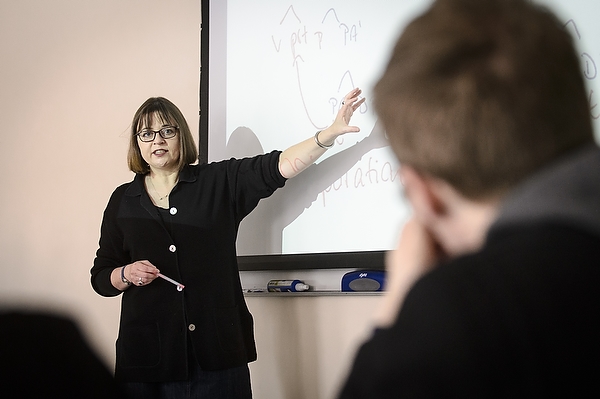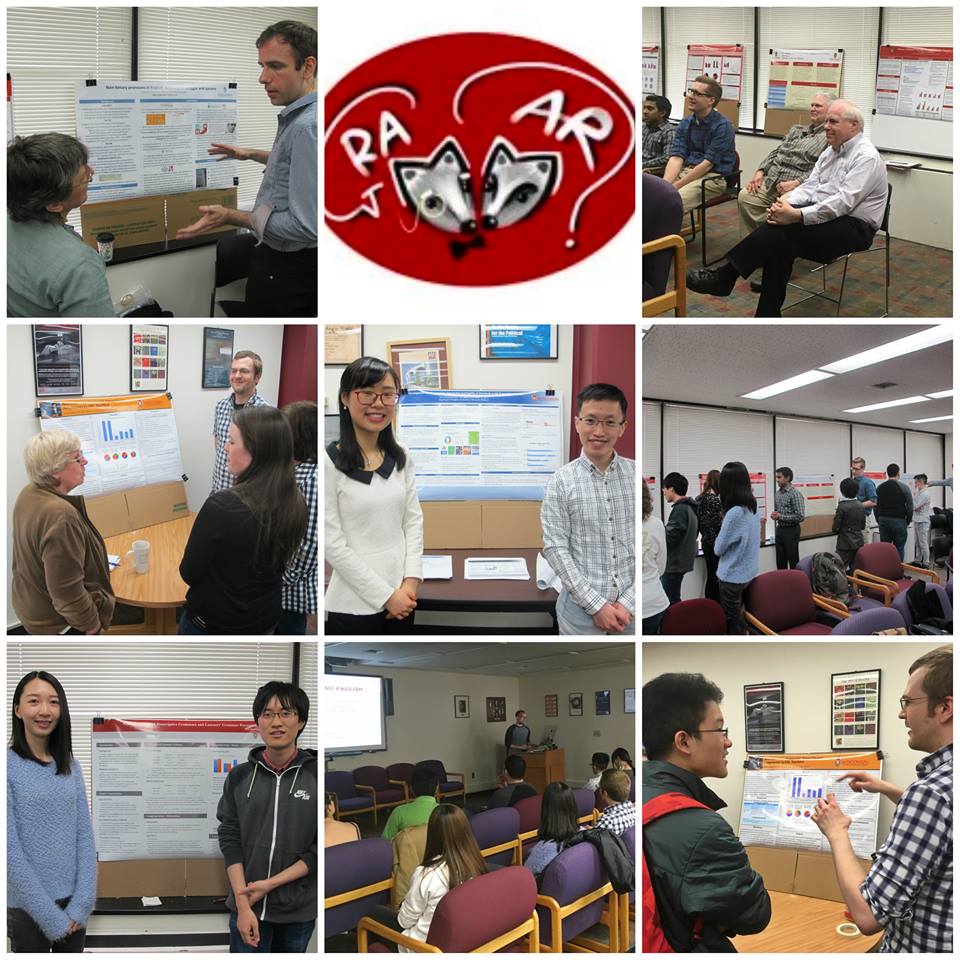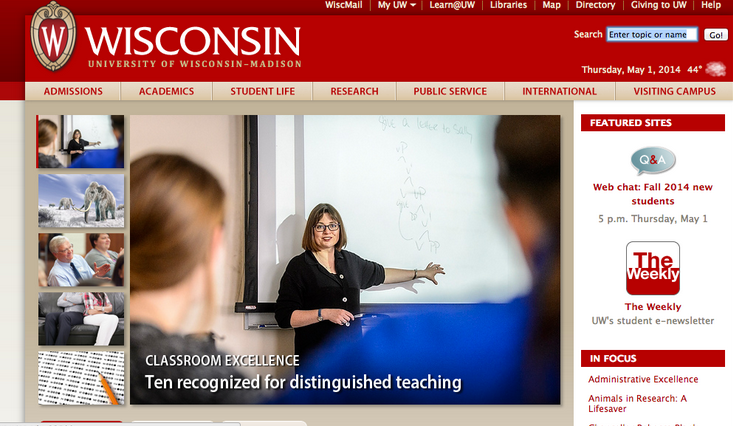I teach graduate and undergraduate courses on English words, English grammar, and syntactic theory. A motto for all my classes is that “grammar is not the enemy.” I’m a member of the University of Wisconsin-Madison Teaching Academy. In 2014, I was honored with a Chancellor’s Distinguished Teaching Award and in 2018 I received the English Department’s Graduate Student Association’s Teaching Award.
Courses that I teach on a regular basis include the following:
ENGL 314: The Structure of English
Course trailer (video):
This course introduces students to the study of English grammar from a linguistic perspective. You will learn that grammar is not something external that is written down in a book, rather, it is something that is part of every speaker’s tacit knowledge about language. In this course, we will try to make some of that knowledge visible. To that end, you will learn to apply linguistic terminology and methods to describe the structure of English words and sentences, both verbally and visually (in so-called tree diagrams). You will also learn to identify linguistic constructions (such as relative clauses or passive constructions) and to analyze how they are employed in different text types. What we will not do is judge anyone’s grammar. Class meetings generally are a mix of lecture, discussion, and problem solving. Students should expect to be called on in class and to participate in group activities. There is a required textbook for this class and readings will be supplemented with videos, podcasts, and other web resources, as well as chapters uploaded to Learn@UW. Assessments include weekly quizzes, four exams (lowest score will be dropped), and a group project, in which students compare the syntactic make-up of two texts from different registers.
ENGL 412: Bad Grammar and Metalinguistic Awareness
In this class we explore the vexed relationship between descriptive and prescriptive approaches to grammar. A descriptive approach is grounded in actual language usage (for example, a descriptive grammar of English would account for the fact that, in informal situations, many speakers of English use double negation for emphasis purposes, as in “I didn’t see nobody”), while a prescriptive approach sets up rules that should be followed (it would argue that the sentence just quoted is not acceptable and should be changed to “I didn’t see anybody”). While the field of linguistics has long rejected prescriptive accounts of language use as irrelevant, misleading, and damaging, the broader culture is fascinated with such accounts, even if they are brought forward by individuals who have no interest in or knowledge of data- or theory-based learning about the structure of language.
In the spirit of Anne Curzan’s suggestion to “engage rather than dismiss” prescriptive voices in public discourses about language, we will make such approaches the object of our inquiry. We will learn about different forms of prescriptivism, the history of prescriptive grammar, the harm that is caused by postulating linguistic norms, and we will discuss in detail some of the constructions that have been/are targets of such approaches, such as sentences ending on prepositions or so-called split infinitives. You will learn to work with linguistic corpora and to engage with the public on topics of grammar as a person with linguistic training. Assessments include weekly quizzes, 2 exams (lower score will be dropped), a creative project (see Grammar Badgers website for examples), and the introduction of a research article in class.
This class is run seminar-style, with a mix of lecture, discussion, and problem-solving activities (often in groups). Expect to be called on in class and to participate in group/team activities. It is expected that you attend all classes and contribute to a welcoming class atmosphere, submit all assignments on time, check in regularly on Canvas, communicate your needs for accommodations in a timely manner, complete all readings before class, participate actively in topic development for projects, do your fair share in group assignments, and proactively search out information that you need.
The focus of this class will be on the following topics:
- Disciplinary view: the concept of “bad grammar” and the role of studying prescriptivism in linguistics
- History and classification: history and types of prescriptivism
- Impact of prescriptive approaches on language: case studies on topics like preposition stranding, split infinitive, who/whom, and singular they
- Impact of prescriptive approaches on language users and communities: marginalization of speakers, biased policies
What we will not discuss in detail:
- spelling, punctuation, pronunciation
- purely stylistic (“Avoid long sentences”) or lexical concerns (“the plural of ‘syllabus’ is ‘syllabi’”)
- dialectal features (e.g., double modals, be-drop) – if you are interested in the intricacies of dialects of American English, you should take a class like English 316, English Language Variation in the U.S.)
ENGL 413: English Words: Grammar, Culture, Mind

This course is an introduction to studying English from three different linguistic perspectives: As objects of grammar, words follow certain rules of combination (you wouldn’t say “these dog”), and they also have internal structure. For example, a word like hopefulness is fine, while nessfullhope or hopenessful do not exist. From a psycholinguistic perspective, this course examines how children learn these formal properties as well as the meaning of words. We will also look at how words are stored in the mind and what one can learn from situations in which one cannot access the mental dictionary properly (for example, when one feels a word is on “the tip of one’s tongue”). From a sociolinguistic perspective, we will look at historical and current influences on English vocabulary, including the role of dictionaries and spelling as a source of standardization. Assessments include weekly quizzes, 4 exams (lowest score will be dropped), and a creative project (typically a video). You can see examples of videos on the Grammar Badgers website.
This course does not require previous knowledge of linguistics. There is no textbook. All materials (chapters, articles, podcasts, videos) will be uploaded to Canvas or linked on Canvas.
ENGL 514: English Syntax
 This class is a twofold extension of “The Structure of English” (English 314): We combine the analysis of sentences with an in-depth exploration of a particular theoretical framework, the Principles & Parameters approach to syntactic analysis, introduced by Noam Chomsky. Both data and analysis will be more complex than in the basic “Structure of English” course. For instance, we will look at infinitives (how do you know that in “He promised her to leave” he is the one who is leaving and that in “He persuaded her to leave” she is the one who’s leaving?), relative clauses, resultatives, and particle verbs, and will contrast the generative approach with a traditional, more descriptively oriented analysis. One of the questions to be pursued is why certain structures are acceptable (grammatical) in English, while others – which look very similar on the surface – are not (compare “When did you say what she should do?” vs. “*What did you say when she should do?”). Each student will become the expert for one particular construction. Undergraduate students present on this construction in class (in teams of two), graduate students additionally write a paper on the construction.
This class is a twofold extension of “The Structure of English” (English 314): We combine the analysis of sentences with an in-depth exploration of a particular theoretical framework, the Principles & Parameters approach to syntactic analysis, introduced by Noam Chomsky. Both data and analysis will be more complex than in the basic “Structure of English” course. For instance, we will look at infinitives (how do you know that in “He promised her to leave” he is the one who is leaving and that in “He persuaded her to leave” she is the one who’s leaving?), relative clauses, resultatives, and particle verbs, and will contrast the generative approach with a traditional, more descriptively oriented analysis. One of the questions to be pursued is why certain structures are acceptable (grammatical) in English, while others – which look very similar on the surface – are not (compare “When did you say what she should do?” vs. “*What did you say when she should do?”). Each student will become the expert for one particular construction. Undergraduate students present on this construction in class (in teams of two), graduate students additionally write a paper on the construction.
ENGL 516: English Grammar in Use

In this course we look at the role of grammar in constituting texts and at the choices speakers make when they use certain syntactic constructions. Specifically, we will look at non-canonical sentences, i.e. sentences that don’t follow the subject-verb-object pattern. We will discuss why speakers choose to express an event one way or another, emphasizing the role of the surrounding discourse and syntactic patterns conditioned by register and genre, such as fronting, cleft sentences, inversion, and particle shift. Class activities will generally be a mix of lecture, data analysis and discussion. Our readings will generally be taken from the required textbook and the articles discussed therein. Some classes will be devoted to discussing research methodology, including working with an electronic corpus and designing research posters. Assessments include weekly homework, two exams (lower score will be dropped), a chart explanation, and a poster presentation.
Graduate Seminars (topics vary):
All of the classes listed above are mixed grad/undergraduate classes. I don’t get to teach graduate seminars very often. If I do, they are on topics aligned with my research areas. A graduate seminar on “Bad Grammar” was the basis for the “Grammar Badgers” project.





